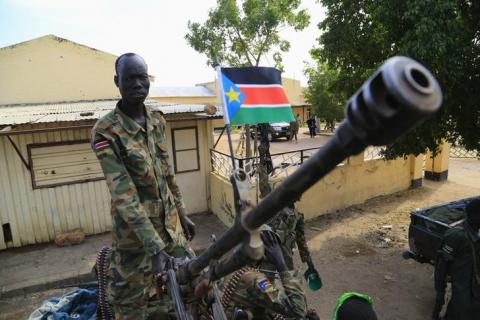Advertisement
Rights groups urge United States to seek U.N. arms embargo on South Sudan: RFN
LONDON (Reuters) - Washington should call for a United Nations arms embargo on South Sudan's warring parties, rights groups said in a letter published on Thursday, as analysts warned that fighting would flare up in the approaching dry season.
Amnesty International, Humanity United and Human Rights Watch (HRW) were among 29 South Sudanese and international organisations urging the United States to table a draft resolution imposing an arms embargo and to try to ensure its passage.
Western diplomats told Reuters in December that a push at the U.N. Security Council to impose sanctions on South Sudan had reached an impasse due to a dispute over the inclusion of an arms embargo, as Washington feared a weapons ban would disproportionately hurt the government.
Civil war has killed more than 10,000 people in the world's newest state, reopened deep fault lines among ethnic groups, caused almost two million to flee and driven the country of 11 million closer to famine.
Geoffrey Duke, secretariat team leader at the South Sudan Action Network on Small Arms, said now was the time for Obama to take action to ensure that 2015 would not be a repeat of the "horrific last year for South Sudanese".
The United States is responsible for drafting resolutions and statements on South Sudan at the U.N. Security Council, HRW said.
"More weapons will mean more fuel to the fire, more attacks on civilians, arbitrary killings, rape, burnings and pillage," Duke said in a statement as the letter was published.
The letter said serious human rights abuses by government, opposition forces and other armed actors had pushed much of South Sudan into one of the world's worst humanitarian crises.
It said the arms embargo would help stop the supply of weapons to individuals and groups on both sides who had carried out widespread and systematic killings of civilians and targeted people based on their ethnicity.
"Despite criticism by the international community and many threats of sanctions, neither the government nor the opposition has provided any meaningful accountability for horrific abuses," the letter said.
Rebels and the government accused one another earlier this week of planning a return to full-blown conflict after a lull in the rainy season.
Violence erupted in South Sudan in December 2013 after months of political tension between President Salva Kiir and his sacked deputy and rival, Riek Machar. The conflict pits Kiir's Dinka ethnic group against Machar's Nuer.



















Add new comment